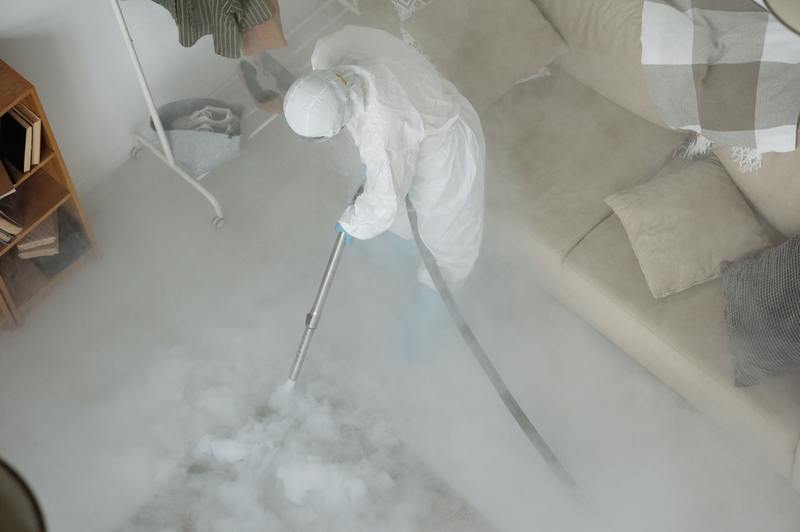How long does an indoor pest control last is frequently asked nowadays. After all, pest control service is another expenditure that you should practically consider.
Availing pest control service is a smart decision especially if the pests inside your home are becoming a constant nuisance. With these recurring pest issues, homeowners need to consider the effectiveness and efficiency of their chosen pest control service provider.

Thus, considering the longevity of pest control treatment could affect homeowners’ preferences. In contrast to this discussion, it is equally important to know “how long does pest control take to work.”
The Use Of Pesticides In Indoor Treatment
Most indoor pests like cockroaches, flies, termites, and mosquitoes prefer damp environments, where they need moisture to live. Meanwhile, rodents like mice and squirrels can infiltrate your house through attic and basement entry.
Commonly, indoor pest control treatment usually involves high-grade pesticide application and meticulous inspection in different areas and corners of your home. Though the use of toxic pesticides is authorized, modern pest management experts are encouraging pest control companies and operators to minimize its use, for it can be a major problem in the future.
If you want to guard your family and pets against synthetic chemicals, there are still some pest control companies which offer non-toxic pest control treatment.
Advanced indoor pest control treatment
In indoor pest control, it is crucial for pest control experts to identify all possible points of entry and breeding ground for these pests. Once the operator has found the source of the problem, it is time to perform an exclusion process like sealing gaps and several repairs.
Additionally, operators may recommend landscape changes around the house for it could be the source of pest invasion. In the worst case, however, pesticide application is not powerful enough to eradicate active pest infestations like termites.
In this case, advanced pest control or fumigation is required. Fumigation is an intensive procedure of using gaseous chemicals to suffocate and exterminate pests within the structure.
With that, clients, together with their pets are advised to temporarily leave their homes as part of the company’s safety measures. When the client agrees to the conditions of fumigation, a group of pest control operators will enclose your home through a large tent and then release a chemical gas that is strong enough to penetrate persistent pests.
After application, experts monitor the situation of the atmosphere by using a gas analyzer machine or gas sniffer to check if there is still a reek of chemical gas before clients move in. At the same time, clients are also informed to open doors and windows after fumigation.
Always bear in mind the safety precautions in order to prevent health risks. If you want to invest in a service company, read this article entitled, “what is the best pest control service?”
Tips for homeowners
It is possible to do indoor pest control by yourself, since pesticides are widely available in supermarkets or hardware stores. However, your lack of expertise in handling pest issues could not solve the problem.
Besides, it is advisable for homeowners to call out licensed pest control operators to look over the situation of their home and therefore do the proper intervention. Supplementary, licensed pest control operators also know how to handle pesticides that are commonly toxic to humans, animals, and the environment.
Aside from the use of toxic pesticides, Integrated Pest Management (IPM) approach suggested a safer pest control for households. It was also highlighted that practicing preventive measures to suppress the chance of pests’ infestation could be the general concern of every homeowner.
By simple cleaning, proper food storage, and regular garbage disposal, you could reduce the possibility of pests from emerging. However, these pests are usually too small to spot, as they can thrive on cracks and crevices, cabinets and storage, attics and basement, or in moist areas of your home.
How Long Does Indoor Pest Control Treatment Normally Last?
Considering the effectiveness of pest control treatment, the homeowner’s choice of service would vary. Thus, it also depends on the treatment needed in your home.
Normally, general indoor pest control treatments last for a few months. This type of treatment commonly targets indoor pests like rodents, flies, fleas, cockroaches, and mosquitoes.
However, there is no assurance that your pest problem is solved completely in just a single treatment. Fortunately, pest control companies are now offering bundled services or contracts for these recurring pest issues.
For serious pest problems, indoor pest control treatment generally lasts for 3 to 6 months and has to undergo quarterly inspections. To simplify, a serious pest situation requires a longer time to completely exterminate persistent pests.
Conclusion
Pests are unwanted visitors in every house which everyone wants to get rid of. Aside from the mess, it is likewise unpleasant to see these pests infiltrating your home.
With that, it is practical to consider pest control treatment that is professionally done by pest control operators. Thus, being able to learn how long does an indoor pest control last will help your pest management decisions in present and in the future.
Still, it is essential to consider alternative pest control methods to lessen your expenditures.
